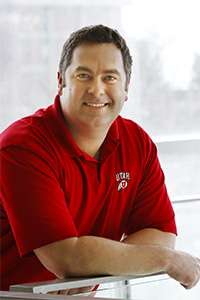Rob Stoll, assistant professor of mechanical engineering at
the University of Utah, has received a five-year Faculty Early Career
Development (CAREER) award from the National Science Foundation. This
$492,091 grant is for a project titled “A Multiscale Study of Heavy
Particle Transport in Sparse Canopies.”

“I am really excited about this award, which involves studying how
particles move through plant canopies and the lower atmosphere,” says
Stoll. “This is a new research direction I have started since moving to
the University of Utah. The grant will help transition this from a new
topic that started with a UofU SEED grant, into a long term focus of my
research group. I’m really looking forward to the new field and lab
experiments we will be going as part of this project.”
With the NSF CAREER grant, Stoll will explore how particles in the
atmosphere move through and above plant canopies. These studies will
shed light on how ecosystems function and how to manage any positive or
negative effects of different particles (e.g., fungal spores, pollens,
bacteria, pollutants).
Stoll says these studies will help develop a new comprehensive
understanding of the impact of canopy geometry on flow dynamics and
particle movement across a wide range of spatial length scales: how
canopy geometry affects ecosystem functioning and services, how
ecosystems are connected across landscapes, how airborne diseases spread
through agricultural fields and general heavy particle dispersion.
In addition, Stoll will collaborate with teachers at Highland High
School in Salt Lake City to develop new classroom laboratory modules
that teach students how engineers and scientists study plant diseases in
natural and agricultural ecosystems, and the role that the wind plays in
how these diseases spread.
Stoll’s group investigates the physical processes that govern
land-atmosphere interactions and transport processes in the atmospheric
boundary layer using numerical simulations, field and laboratory
experiments and mathematical analysis.